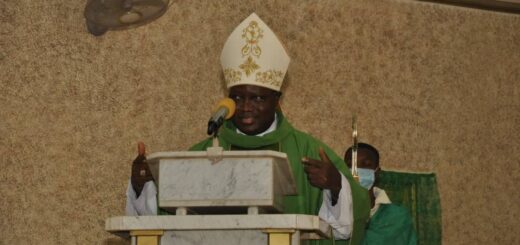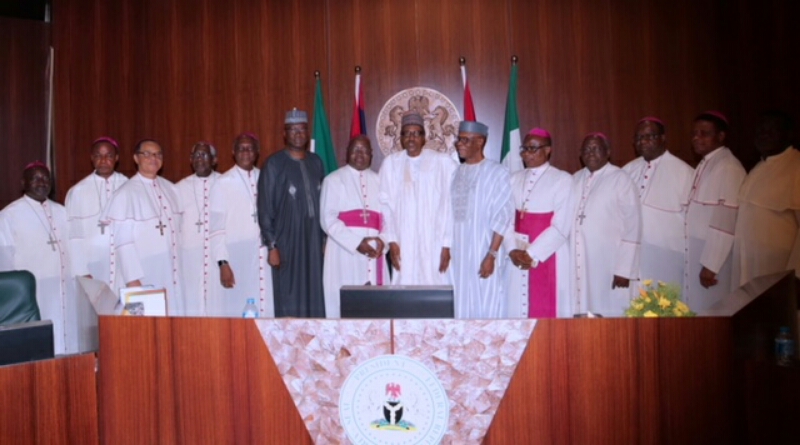56th World Communications Sunday: The value of active listening
7th Sunday of Easter, Year C (World Communications Day), Mater Dei Parish, Gwagwalada, Abuja, 29th May 2022. Homily by Archbishop I. A. Kaigama
Readings: Acts 7:55-60; Rev. 22: 12-14, 16-17, 20; Jn. 17:20-26.
On this 56th World Communications Sunday, I am happy to visit the parish of the Chairman of Abuja Archdiocesan Catechetical Commission (Fr. James Akpaamo) and you the beloved parishioners of Mater Dei Parish, Gwagwalada. The readings today point to communicating and listening, which are very essential components of daily life and the precious task of evangelization.
A woman at Mass once began to shed tears while a priest was preaching, and the priest thought it was because he was preaching so well. After Mass, the priest curiously asked the woman why she was shedding tears. Expecting to hear that it was because of his powerful sermon, the woman said the priest’s beard was moving while he preached, and it reminded her of her dead he-goat knocked down by a motorcycle. Some years ago in Rome, a Jewish guide conducting us around their Synagogue showed us paintings of Jews having their ears inspected during Mass in Church. Because the Jews were forced to attend Mass against their wish, they devised a method of sticking wax into their ears so that they would not hear the Christian message. When there is no correlation between what is being communicated and the person listening, the results are absent. Many wonder why there is so much religiosity in our country but little practical positive impact on our private and national lives. The simple reason is because of defective listening. Today, although everyone is communicating, our listening ability seems to be deteriorating very fast. Every day we spend hours and hours chatting or texting, and answering calls, but the truth is we barely listen to the person sitting next to us and engage him or her in a meaningful conversation. Even in the Church, listening is problematic. If I should ask how many can remember where the readings today came from, many would not know, because their minds were elsewhere when the lector was reading,
On this World Communications Day, the message of His Holiness, Pope Francis, titled: “Listening with the ear of the heart,” invites us to reflect on the value of active listening and its importance in day-to-day relationships. God first took the initiative to speak to us and expects us to listen actively when He said: “Hear, O Israel” (Dt. 6:4). Sadly, human beings often turn their back on God. Stephen’s audience covered their ears (cf. Acts 7:57) because they did not want to listen to God’s word. It is however “only by paying attention to whom we listen, to what we listen, and to how we listen that we can grow….” (cf. Apostolic Exhortation Evangelii Gaudium, 171).
Stephen was one of the deacons chosen to see to the material needs of Hellenist widows in the early Church. Stephen went beyond the call of duty to communicate the word of God with so much conviction, persuasion and courage. He was charged by the Jewish authorities of blasphemy and condemned to death. As they stoned him, he cried out, “Lord, do not hold this sin against them” (Acts 7:60). Stephen forgave and prayed for his murderers while he was being killed because he was listening to the voice of God deep within.
In today’s Gospel the theme of unity resounds in the priestly prayer of Jesus: “Holy Father, I pray not only for them, but also for those who will believe in me through their word, so that they may all be one” (Jn. 17:20-21). In our communities, states, and nation, we experience growing disconnect, rivalry, and disunity. Our social and conventional media unfortunately tend to contribute to this. The unity Jesus prayed for is possible only with the love of God in us. It would be edifying if citizens of other countries visit Nigeria and see that we are so united in mind and heart, and exclaim “see how these Nigerians love themselves!” This type of unity can come about if we have the spirit of what the Zulu call “Ubuntu” (I am because you are). This spirit is explained in the story told of an anthropologist who put a basket of fruits near a tree and told the children that the first one to reach the fruits would have the whole basket. When he told them to run, they all took each other’s hands and ran together and sat together enjoying the fruits. When he asked why they ran like that, as one could have run fast to collect the fruits for himself alone? They said one cannot be truly happy if all the others are sad.
The party primaries held by some political parties have left many Nigerians flabbergasted and sad. Instead of demonstrating love for democracy and exercising their civic responsibility, money was said to be the major factor; not the concern for electing leaders who are honest, God-fearing and able to manage our state and national affairs with prudence. Nigerians must choose to listen to the voice of reason, not be influenced by the attraction of money, and be guided by what is honourable, just, pure, lovely, or gracious (cf. Phil. 4:8). We must listen to one another and together we can succeed. It is imperative for Christians, Muslims and African traditionalists to listen to the voice of God; keep communication channels among us open, and realize that what unites us is far greater than what divides us.
May the Holy Spirit descend on those to be confirmed today, and may the coming of the Holy Spirit at Pentecost flood every nook and cranny of Nigeria with divine favours and help us to be better listeners, to keep the Word of God in our hearts and practice it in daily life, and be more sensitive to the needs of our neighbours.




